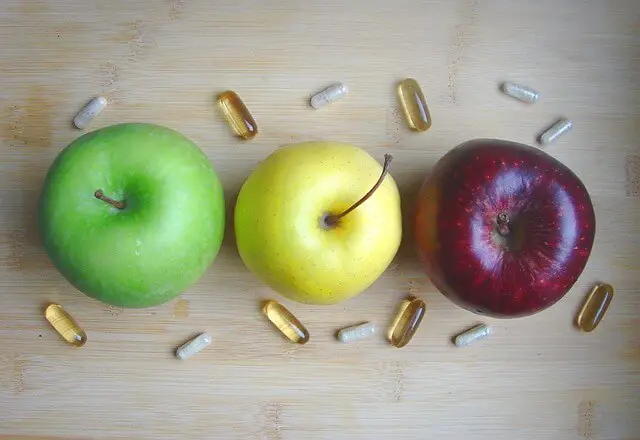Vitamins for Dogs - When Are They Necessary?
22.03.2021.
Vitamins are essential for the body. They play many different and vital roles in body functions. Even basic things, like growing or repairing body tissue, would not be possible without vitamins. Vitamins for dogs are the same as for humans; the difference is dogs need a different amount than we do. Before you start giving vitamin supplements to your dog just because other dog owners advised you to, here are some things you should keep in mind.
What are vitamins?
Vitamins are natural compounds necessary to sustain and develop life. They can be found in foods, and different foods contain different vitamins. Humans and dogs use them for essential body functions, and a lack of vitamins can present a health hazard.
Are they necessary for dogs?
Yes. All mammals and other living beings use vitamins. From creating collagen to boosting the immune system, vitamins play a vital role in every dog’s life. Make sure your dog has a balanced diet where they receive every nutrient they can need. If a dog is fed a balanced diet, there is usually no reason anything has to be added to their diet.
Vitamins are not the only supplements dog owners give their dogs. Check out one of the best supplements for joint pain here - Glucosamine for dogs.
Vitamins in dog food
If you check most dog foods, they are branded as “balanced and complete.” That means that it already contains all the minerals, vitamins, proteins, and even other supplements, like glucosamine, your dog might need. However, the dog’s needs change throughout their life, and a puppy has different needs than a senior dog.

The most crucial stage of a dog’s life is puppyhood. They are developing quickly, and the diet needs to be high-quality. If the puppy gets too many vitamins and minerals, especially calcium, which promote bone growth, they can start growing too fast. That is especially dangerous for breeds like the Great Dane since fast development can cause them to develop health issues. The most significant development concern in this breed is hip dysplasia.
Vitamins for dogs and a home-made diet
Preparing dog food at home is becoming more and more popular throughout the US. As large corporations’ trust falls, many dog owners are opting for serving their dogs home-made food. It will require more time and engagement, but owners can have complete control of what their dogs ingest.
One problem with home-made dog food is the lack of vitamins. If you’re thinking about switching your dog to home-made food, talk to your vet about supplements. Your dog will need additional vitamins that can support their health and development. However, it is not enough to just give them multivitamin pills; the vitamin intake should be carefully designed with your vet or a dog nutritionist.
One of the healthiest ways to get more vitamins into your dog is to feed them healthy fruits. Check out this article for more info - Healthy fruits for dogs.
What are the risks of vitamins for dogs?
While vitamins are essential to life, they can potentially be harmful in large amounts. Dogs that need vitamin supplements have to be careful about how much they eat. Famously, dogs don’t really care about precautions, so it is up to us to control it.

There are some potential issues dogs can get from ingesting too many vitamins, especially vitamin A. Too much vitamin A for dogs can cause blood vessel issues, joint pain, and dehydration. You should never give your dog supplements before talking to a vet. Make sure your vet approved it, and you understand the safe amount of vitamins your dog can take.
How to choose dog vitamins?
The first step you need to make is to talk to your vet or a dog nutritionist. Most dog owners give their dogs vitamin supplements because they feel like they are doing something good for the dog’s health. However, that is not always the case, and dog owners don’t necessarily know everything they should know before placing their dogs on vitamin supplements.
Of course, there are some cases where dogs will need vitamin supplements. Dogs that are recovering from injuries, infections, dogs on home-made diets, and dogs with vitamin deficiencies should take vitamins for dogs. However, it is vital the dog gets precisely the vitamins they are missing and not random vitamin supplements. Make sure you talk to your vet; they might recommend a diet change. There are industrial dog foods with fruits and vegetables included, which will provide the dog with all the vitamins they need.
One of the best things that can be added to the dog’s diet is fish oil. Check out this article for more information - Salmon oil for dogs.
What are the most essential vitamins for dogs?
Most of us are familiar with the most important vitamins humans and dogs need for sustaining a healthy body. Vitamins for dogs are similar to those that humans need; the most significant difference is the amount we need and the amount dogs need. These are the most essential vitamins for dogs;
Vitamin A
This vitamin for dogs is responsible for good vision (they can get it from carrots), immune system, body tissue growth, fetal development, and cell function. This is a fat-soluble vitamin.
Vitamin B
Rather than being a single vitamin, vitamin B is actually a group of vitamins with different functions. Here are the most important members of that group;
- Riboflavin - Enzyme functions
- Thiamine - Regulates carbohydrates and extracts energy from them
- Pantothenic acid - Helps with energy metabolism
- Vitamin B6 - The most important part of the group. It helps with red blood cell and nervous system function, immune response, niacin synthesis, hormone regulation, gene activation, and glucose generation.
- Folic acid - Plays a part in nucleotide and amino acid metabolism.
Vitamin C
Vitamin C for dogs is probably the most famous of vitamin supplements, not only for dogs but for humans as well. Dogs can produce it themselves, but sometimes, supplements might be needed. This vitamin helps the body repair and build new body tissue, boosts the immune system, reduces inflammation, helps with cognitive aging, and is an antioxidant.
Vitamin D
Vitamin D is also called the “sunshine vitamin.” Without this vitamin, the dog would not develop properly. It is responsible for healthy bone and muscle functions. Plus, this vitamin for dogs balances phosphorus and calcium, which allow the bones to develop properly.
Vitamin E
Without vitamin E, the dog would most likely develop reproductive issues and eye and muscle degeneration. This vitamin is one of the first lines of defense against oxidative damage.
Vitamin K
This vitamin is crucial for blood clotting. Some toxic things like rat poison can affect that process and cause hemorrhaging and death if left untreated.
In conclusion
There are more than enough healthy vitamins for dogs in a balanced diet. Dogs don’t necessarily need vitamin supplements to keep their best health. The best thing you can do for them is to make sure they are on a healthy diet. If you are thinking of implementing supplements into your dog’s diet, make sure you talk to your vet. They can tell you everything you need to know about vitamins for dogs.
World Dog Finder team







Share